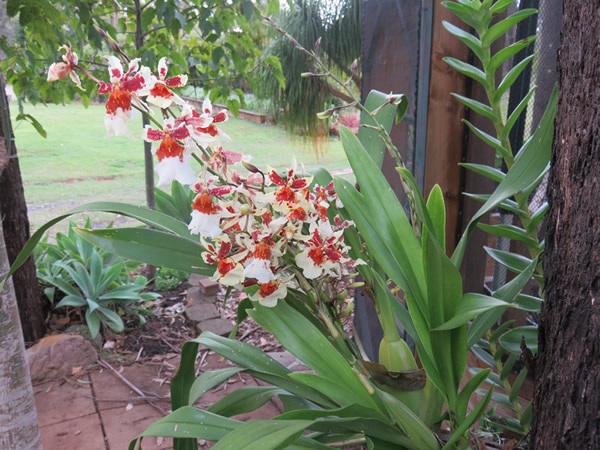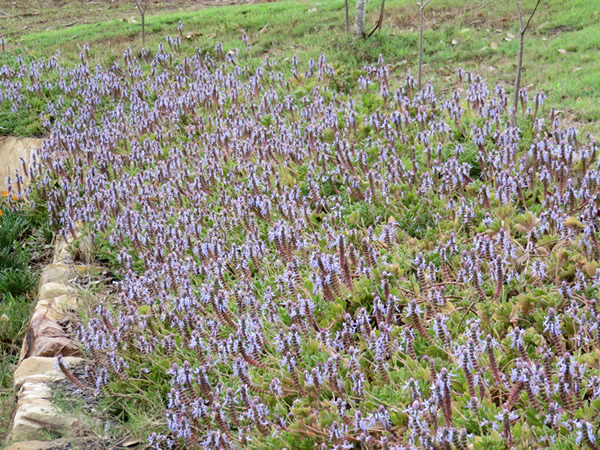2016-09-15 23:35 It's spring now
Y (Kuma's owner)
Whether I want it or not, spring has come. Usually, people love spring. The cold weather has gone, colourful flowers are starting to bloom, and everything looks beautiful. It's nice to notice that spring is almost here when I find flowers blooming.

However, this year was different from usual. I saw a snake, and then I realised that it's spring now. I'm sorry to the snakes, but images of flowers are more suited to spring than those of snakes. During the week that has passed, I was bitten by a mosquito (in Australia, a mosquito is called a mozzie). A hateful thing is that a mozzie was waiting for me in the bathroom. How clever she was! This made me realise that spring has made one step forward and summer is not far away.

You might think that it must be summer if there are mozzies here. This area is subtropical and mozzies emerge in spring and late summer. In mid summer, there are no mozzies. I'm just guessing that it may be too hot in summer for them.

A snake came out, mozzies are waiting for me in the bathroom, what's next? I now try to be very careful when I wear rain boots because toads love rain boots. Every time I wear rain boots, I check the inside of the boots. Please don't ask me why they love rain boots. I would like to know that as well.

2016-09-09 10:08 Otaku People
Y (Kuma's owner)
There are lots of Japanese words that became English words. For example, tsunami, sushi, teriyaki, sushi, panko and so on. Looking at these words, most of them are related to food. However, there is one of the common Japanese origin words that is not related to food. That is otaku.
My understanding was that "otaku" had a little negative meaning in Japan a few years ago. Maybe it still does. If I heard "He is an otaku", I would imagine that he has hobbies that he can be completely absorbed in something like animation films, movies, computer hardware and software.
I'm not sure of the suitable English word for otaku. Well, it is supposed to be nerd. I don't know many English words. I guess there should have been some more similar meaning words in English.
While many people imagine otaku people in negative way, I think otaku are important to create new things. They have plenty of knowledge in particular categories. At the time when this word is lionized by the media, most Japanese media introduced otaku people who are sitting at the computer desk or walking in Akihabara Electric Town. The media described otaku people as if they are an odd fellow who has only interests in what he likes in an amusing way. That has made up their impression.
I think scientists are a kind of otaku and so are artists. If we need to research or create something, we have no choice but to be an otaku. Otaku can create culture.
2016-09-08 04:51 Regional Dialects in Japan
Y (Kuma's owner)
My husband and I had guests from Japan last month. It was fun to have guests, and we enjoyed chatting. It's usually nice and easy to talk in my mother tongue, however my Japanese is standard and the guests' were Tosa regional dialect. This was a bit awkward. Honestly, I couldn't understand 100% of what they said. My brother-in-law has an Aussie friend who had lived in Tosa (Kochi-Pref.). He can understand the Tosa regional dialect more than I do.
I had learnt Spanish a little. One day, I turned on the TV and saw an educational channel of Italian. On TV, two tourists were talking about where the museum was. The surprising thing was I could understand what they were saying.
Then I thought why do we call all the dialects in Japan Japanese? There are various dialects in Japan. Recently, the dialects are replacing standard Japanese little by little where people around the capital city Tokyo speak Japanese. Therefore, everybody understands or speaks standard Japanese but dialects still remain.
I heard that if someone who speaks Kagoshima (South island of Japan) dialect and someone who speaks Tohoku (North part of Japan) dialect meet and talk, they cannot understand each other but we call all these languages Japanese. I don't know why? I guess that the difference between Kagoshima dialect and Tohoku dialect is bigger than Italian and Spanish.
It's interesting that there are so many dialects in such a small country.